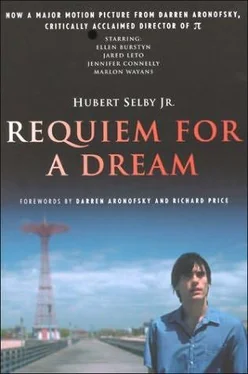Hubert Selby - Requiem for a Dream
Здесь есть возможность читать онлайн «Hubert Selby - Requiem for a Dream» весь текст электронной книги совершенно бесплатно (целиком полную версию без сокращений). В некоторых случаях можно слушать аудио, скачать через торрент в формате fb2 и присутствует краткое содержание. Год выпуска: 1978, Жанр: Контркультура, на английском языке. Описание произведения, (предисловие) а так же отзывы посетителей доступны на портале библиотеки ЛибКат.
- Название:Requiem for a Dream
- Автор:
- Жанр:
- Год:1978
- ISBN:нет данных
- Рейтинг книги:3 / 5. Голосов: 1
-
Избранное:Добавить в избранное
- Отзывы:
-
Ваша оценка:
- 60
- 1
- 2
- 3
- 4
- 5
Requiem for a Dream: краткое содержание, описание и аннотация
Предлагаем к чтению аннотацию, описание, краткое содержание или предисловие (зависит от того, что написал сам автор книги «Requiem for a Dream»). Если вы не нашли необходимую информацию о книге — напишите в комментариях, мы постараемся отыскать её.
Requiem for a Dream — читать онлайн бесплатно полную книгу (весь текст) целиком
Ниже представлен текст книги, разбитый по страницам. Система сохранения места последней прочитанной страницы, позволяет с удобством читать онлайн бесплатно книгу «Requiem for a Dream», без необходимости каждый раз заново искать на чём Вы остановились. Поставьте закладку, и сможете в любой момент перейти на страницу, на которой закончили чтение.
Интервал:
Закладка:

Hubert Selby, Jr
Requiem for a Dream
This book is dedicated, with love, to Bobby, who has found the only pound of pure—Faith in a Loving God
Except the LORD build the house,
they labor in vain that build it…
Psalm 127:1
Trust in the LORD with all thine
heart; and lean not unto thine
own understanding.
In all thy ways acknowledge him, and he shall direct thy paths.
Proverbs 3:5,6
Foreword
When I was in high school, I thought you had to be dead to be a novelist—dead, and from somewhere else: England, the Midwest, France.
One of the more profound, if peripheral, epiphanies hitting me upon reading Last Exit to Brooklyn by Hubert Selby, Jr., was that my workingclass Bronx world was valid material for Art; that the voices, the streets, the gestures that I knew so well were as human, as precious, and as honorable as any found through the centuries and civilizations of literature.
Which is to say that I set down Last Exit to Brooklyn with the terrifying realization that if I had the will and the talent to go with the eye and ear, I could grow up to be a writer.
It wasn’t until I was much older that I realized that talent and material mean nothing without something else that Selby possesses and projects on every page of every book he has written: Love—a forgiveness and compassion that elevate all the bottom dogs that populate his world, the lost, the depraved, thsse coldblooded, and the insensate. His art is his ability to humanize the seemingly inhuman, and by extension to humanize the reader.
No one can convey the visceral experience of the suffering of people like Selbythe cruel hallucinations of grace, of peace, of love, of Easy Street; the wracking ache of junk sickness; the choking rage of parental/marital/sexual claustrophobia; the tightening screws of paranoid delusion; the pathetic grandiosity of walkaround dreams; and the dread of the inevitable dawn.
Selby burrows under the skin and into the brains of the urban underclass to deliver infernal monologues seething with tragically skewered delusions, shortterm ecstasies, and obsessive furies that crash and boil across the page, ceaselessly. At his best, he can literally stun us into empathy.
Requiem for a Dream tracks the destruction of four peoplethree young, and one older. Here, Selby reports from the marrow of those addicted: to dope, to hope, to tragically childish visions of heaven on earth. Even as its characters ascend to the heights, their nightmarish plummet can be foreseen, but this foreknowledge doesn’t protect the reader from experiencing the almost unbearable suffering, the degradation and oblivion, that is the price of dreams among the powerless.
Requiem for a Dream is quintessential Selby, fueled by moments which make the reader feel like the unwilling newscaster witnessing the Hindenburg disaster who sobbed, “Oh, the humanity !”
It is Selby’s gift to us that once again we find ourselves aching for his people—which is to say we find ourselves loving the unlovable.
— Richard Price
New York City
January 1988
Preface to the New Edition
Requiem for a Dream was originally published in 1978. It is extremely gratifying to know that it is still in print and going into another edition. Also, it is being made into a film, production scheduled to start the middle of April this year. So the book still lives and breathes (as do I).
For me there is something beautiful and ironic in the fact that all this is happening now, during a time of “unparalleled prosperity.” The Great American Dream is coming true for many. Obviously, I believe that to pursue the American Dream is not only futile but selfdestructive because ultimately it destroys everything and everyone involved with it. By definition it must, because it nurtures everything except those things that are important: integrity, ethics, truth, our very heart and soul. Why? The reason is simple: because Life/life is giving, not getting.
I am not suggesting we need to give everything to the poor and homeless—the millions of them who are still here in the midst of plenty—put on a hair shirt and go through the streets with a begging bowl. This, in and of itself, is no more nurturing than the pursuit of “getting.” I am not afraid of money and what it can buy. I would love to have a house full of stuff—of course I would need a house first. I have been hungry and see nothing noble m hunger. Neither do I see anything noble in eating high on the hog though eating is certainly better. But to believe that getting stuff is the purpose and aim of life is madness.
It seems to me that we all have a dream of our own, our own personal vision, our own individual way of giving, but for many reasons we are afraid to pursue it, or to even recognize and accept its existence. But to deny our vision is to sell our soul. Getting is living a lie, turning our back on the truth, and Visions are glimpses of the truth: Obviously nothing external can truly nurture my inner life, my Vision.
What happens when I turn my back on my Vision and spend my time and energy getting the stuff of the American Dream? I become agitated, uncomfortable in my own skin, because the guilt of abandoning my “Self/self,” of deserting my Vision, forces me to apologize for my existence, to need to prove myself by approaching life as if it’s a competition. I have to keep getting stuff in an attempt to appease and satisfy that vague sense of discontent that worms its way through me.
Certainly not everyone will experience this torment, but enough do and have no idea what is wrong. I’m sure the psychologists have a term for this freefloating anxiety, but the cause is what is destroying us, not the classification. There are always millions who seem to get away with doing the things that we think abominable, and thrive. It certainly appears that way. Yet I know, absolutely, from my experience, that there are no free lunches in this life, and eventually we all have to accept full and total responsibility for our actions, everything we have done, and have not done.
This book is about four individuals who pursued The American Dream, and the results of their pursuit. They did not know the difference between the Vision in their hearts and the illusion of the American Dream. In pursuing the lie of illusion, they made it impossible to experience the truth of their Vision. As a result everything of value was lost.
Unfortunately, I suspect there never will be a requiem for the Dream, simply because it will destroy us before we have the opportunity to mourn its passing. Perhaps time will prove me wrong. As Mr. Hemingway said: “Isn’t it pretty to think so?”
— Hubert Selby, Jr.
Los Angeles
1999
Foreword to the New Edition
I was a public school kid from Brooklyn facing my first exams during freshman year of college, and I was terrified. High school was a joke. The only thing I learned was how to get away with cutting class. So, when college came around I wasn’t very prepared. I hit the library and tried to learn.
But Selby fucked everything up.
Out of the corner of my eye I saw the word “Brooklyn.” Now when you’re from Brooklyn and you see anything related to Brooklyn you’re immediately interested. I pulled a worn copy of Last Exit to Brooklyn off the shelf. This was before the movie, and I had no clue what I was holding. From sentence one I was done, and so were my finals. I blew them off and I read. I read and I read and I screamed and I connected and I recited and I rejoiced. This was storytelling. This was understanding. This was a deep yet simple examination of what makes us human. I now knew what I wanted to do. I wanted to tell stories.
Читать дальшеИнтервал:
Закладка:
Похожие книги на «Requiem for a Dream»
Представляем Вашему вниманию похожие книги на «Requiem for a Dream» списком для выбора. Мы отобрали схожую по названию и смыслу литературу в надежде предоставить читателям больше вариантов отыскать новые, интересные, ещё непрочитанные произведения.
Обсуждение, отзывы о книге «Requiem for a Dream» и просто собственные мнения читателей. Оставьте ваши комментарии, напишите, что Вы думаете о произведении, его смысле или главных героях. Укажите что конкретно понравилось, а что нет, и почему Вы так считаете.












